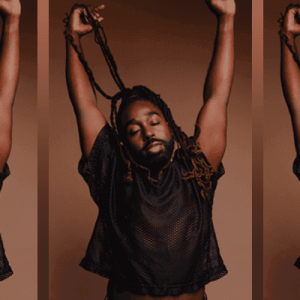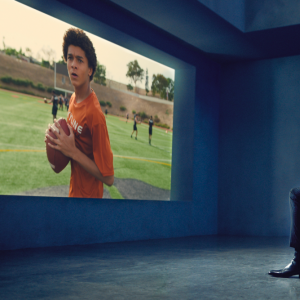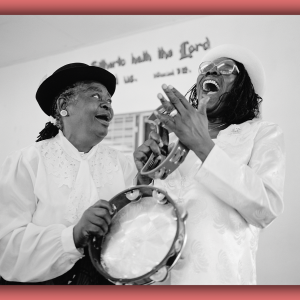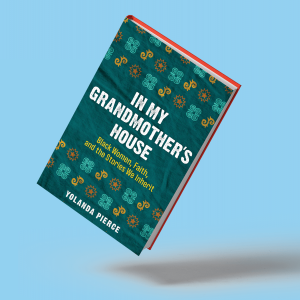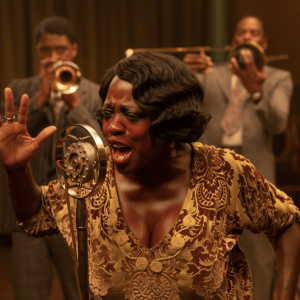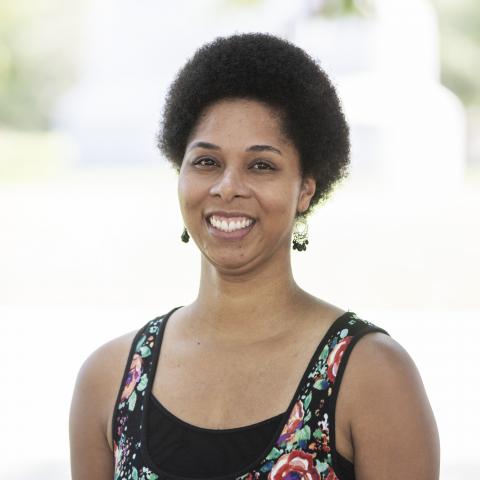
Rebecca Riley is a writer, filmmaker, and a former multimedia/online assistant at Sojourners. She lives in Southern Maryland.
Posts By This Author
ABC's 'Alaska Daily' Exposes a Wide Audience to a National Crisis
I don’t often turn on a non-news network television show and expect to learn. Instead, I expect to laugh, maybe cry (I’m looking at you, This Is Us), see loads of inaccurate depictions of medical interventions, or simply be entertained. But ABC’s new primetime drama Alaska Daily has me expanding my perspective on the possibilities of network TV. And that’s thanks to the light it’s bringing to a dark truth: the crisis of missing and murdered Indigenous women.
‘Whatever God Brings, We’re Going To Be In It’
R&B artist Mykal Kilgore celebrates the holiness in being our whole selves.
A MYKAL KILGORE performance isn’t just a show or concert; it’s an experience. Kilgore’s mind-blowing vocals and presence captivate, yes, but there’s more to it than that. In creating an atmosphere abundant in inclusion, empowerment, freedom, joy, truth, and love, Kilgore ministers to the soul. It’s a taste of the beloved community we hunger for.
A Black queer man, Kilgore uses his platform and prodigious talent to advocate for Black and LGBTQ issues. With a Grammy nomination in 2020 for his performance of the song “Let Me Go” further raising his profile, he’s getting even more opportunities to educate and entertain. In December, Kilgore spoke with writer and filmmaker Rebecca Riley via Zoom.
Rebecca Riley: When you perform, what do you hope audiences experience and take with them?
Mykal Kilgore: I want us to do a better job of being present with one another and seeing the thing inside each other that is eternal and sacred and perfect and special: I think that it is God. I want people to leave feeling like they have had a human experience at the show that allows them, and forces them, to be in their own emotions, to find pockets of empathy for others, and, more than anything else, to just truly see one another.
Kaepernick’s Resilience Shines Despite Artistic Flaws in New Show
The six-episode series available to stream on Oct. 29 is the co-creation of Kaepernick and celebrated director Ava DuVernay (Selma, 13th, When They See Us). The series tells the story of Kaepernick’s teen years, when he grew both as an athlete and an individual. Kaepernick must repeatedly decide if he’s going to be true to himself or to who others want him to be, whether it’s how he wears his hair or what sort of future he pursues. It’s a relatable coming-of-age story, but the racial dynamics that Kaepernick confronts make for a more complicated high school narrative.
Beyond the Sanctuary: The Lives of Black Churchgoing Women
Fiction writer Deesha Philyaw explores their complexities.
I'VE NEVER REALLY thought about what church ladies do when they’re not at church. My interactions with them have always been tied to the building and its activities. In pre-pandemic times, I would see them at service and maybe hug or shake hands, chat briefly, or just wave goodbye on my way out the door. But easy smiles and they’ve-got-it-together appearances belie the “less presentable” parts of everyone’s story, bits that, if shared, could create a space where we no longer feel isolated, but instead are comforted by the fact that each of us is trying to deal with at least one hot mess in our lives. The Secret Lives of Church Ladies by Deesha Philyaw unflinchingly tells the stories of a few of those messes, stories of the things that we hide.
Each narrative in the collection aches with a desire for connection, and Philyaw provides the reader a sometimes uncomfortably intimate view of how these “church ladies” try to meet this need. Some characters turn to intimate affairs, choosing partners with whom they can envision more or partners with whom there can never be more than fleeting and secret arrangements, sometimes due to the damage of homophobia. Other stories aren’t about romantic desires at all, but feature characters longing to connect with family, carrying a deep-seated, perpetual wish to simply be seen, valued, loved, and embraced for who they are by the people they thought could be expected to do so.
I particularly love that this collection features characters of diverse ages. I’m so tired of how not-entirely-subtle ageism has crept into various avenues of storytelling, as if all significant human experience, growth, and formation is wrapped up by the time you’re 40. Philyaw rejects this notion and delivers fully formed characters of all ages.
Practicing Faith as a Black Woman in America
Yolanda Pierce's book considers the promise of the Black church.
SOMETIMES I WONDER if my “Black card” is in jeopardy. The main source of this concern is that my encounters with the Black church are few, the most consistent being the yearly family viewing of the 1996 film The Preacher’s Wife, though even I know the brevity of that movie’s scripted sermons is far from accurate. My few in-person Black church experiences taught me the basics: Wear your Sunday best, and expect the service to be long. But beyond that, the Black church has always been a bit of a mystery to me, a place that has never felt familiar.
Yolanda Pierce’s In My Grandmother’s House provides an intimate entry into this world. From tarry nights and foot washing to patriarchal structures, Pierce details her experiences and invites the reader into the tension of celebrating the beautiful aspects of the Brooklyn Holiness-Pentecostal church of her youth while also laying bare the ways in which that church, and the Black church at large, has failed to be the loving and inclusive body it professes to be.
In the preface, Pierce describes her book as “a work of Grandmother theology,” a womanist theology that draws on the generational wisdom of older Black women and provides a different way to know God. With the childhood stories she tells, Pierce seems to identify her grandmother Vivian—the woman who raised her, served faithfully in the church, and whose home displayed a portrait of a Black Jesus—as the primary theologian in her life. In a culture that so often elevates the thoughts and analysis of white, male theologians, to read and reflect upon the lessons that Pierce learned from her grandmother and her church mothers makes an impact, lessons that continue to inform how she lives today.
‘Ma Rainey’s Black Bottom’: A Beautiful, Gutting Tragedy
When I sat down to watch Netflix’s film adaptation of August Wilson’s play Ma Rainey’s Black Bottom, I was hoping to be uplifted by the Black excellence I was sure to find in a film helmed by Viola Davis and the late Chadwick Boseman. I was ready to exhale and escape. But while the anticipated excellence exceeded my high expectations, it didn’t take me long to realize that the uplift I’d hoped for would not be found in this story: Ma Rainey’s Black Bottom is a tragedy.

